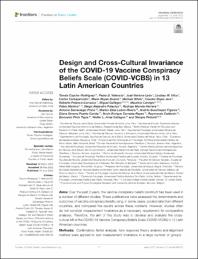| dc.contributor.author | Caycho-Rodríguez, Tomás | es_ES |
| dc.contributor.author | Valencia, Pablo D. | es_ES |
| dc.contributor.author | Ventura-León, José | es_ES |
| dc.contributor.author | Vilca, Lindsey W. | es_ES |
| dc.contributor.author | Carbajal-León, Carlos | es_ES |
| dc.contributor.author | Reyes-Bossio, Mario | es_ES |
| dc.contributor.author | White, Michael | es_ES |
| dc.contributor.author | Rojas-Jara, Claudio | es_ES |
| dc.contributor.author | Polanco-Carrasco, Roberto | es_ES |
| dc.contributor.author | Gallegos, Miguel | es_ES |
| dc.contributor.author | Cervigni, Mauricio | es_ES |
| dc.contributor.author | Martino, Pablo | es_ES |
| dc.contributor.author | Palacios, Diego Alejandro | es_ES |
| dc.contributor.author | Moreta-Herrera, Rodrigo | es_ES |
| dc.contributor.author | Samaniego-Pinho, Antonio | es_ES |
| dc.contributor.author | Lobos-Rivera, Marlon Elías | es_ES |
| dc.contributor.author | Buschiazzo Figares, Andrés | es_ES |
| dc.contributor.author | Puerta-Cortés, Diana Ximena | es_ES |
| dc.contributor.author | Corrales-Reyes, Ibraín Enrique | es_ES |
| dc.contributor.author | Calderón, Raymundo | es_ES |
| dc.contributor.author | Pinto Tapia, Bismarck | es_ES |
| dc.contributor.author | Arias Gallegos, Walter L. | es_ES |
| dc.contributor.author | Petzold, Olimpia | es_ES |
| dc.date.accessioned | 2022-10-24T17:35:55Z | |
| dc.date.available | 2022-10-24T17:35:55Z | |
| dc.date.issued | 2022-06-14 | |
| dc.identifier.uri | https://hdl.handle.net/20.500.13053/6914 | |
| dc.description.abstract | “Aims: Over the past 2 years, the vaccine conspiracy beliefs construct has been used in
a number of different studies. These publications have assessed the determinants and
outcomes of vaccine conspiracy beliefs using, in some cases, pooled data from different
countries, and compared the results across these contexts. However, studies often
do not consider measurement invariance as a necessary requirement for comparative
analyses. Therefore, the aim of this study was to develop and evaluate the crosscultural MI of the COVID-19 Vaccine Conspiracy Beliefs Scale (COVID-VCBS) in 12 Latin
American countries.
Methods: Confirmatory factor analysis, item response theory analysis and alignment
method were applied to test measurement invariance in a large number of groups. Results: The COVID-VCBS showed robust psychometric properties and measurement
invariance for both factor loadings and crosstabs. Also, a higher level of acceptance of
conspiracy beliefs about vaccines is necessary to respond to higher response categories.
Similarly, greater acceptance of conspiracy beliefs about COVID-19 vaccines was related
to a lower intention to be vaccinated.
Conclusion: The results allow for improved understanding of conspiracy beliefs about
COVID-19 vaccines in the countries assessed; furthermore, they provide researchers
and practitioners with an invariant measure that they can use in cross-cultural studies in
Latin America. However, further studies are needed to test invariance in other countries,
with the goal of developing a truly international measure of conspiracy beliefs about
COVID-19 vaccines.“ | es_ES |
| dc.format | application/pdf | es_ES |
| dc.language.iso | eng | es_ES |
| dc.publisher | Frontiers Media S.A. | es_ES |
| dc.rights | info:eu-repo/semantics/openAccess | es_ES |
| dc.rights.uri | https://creativecommons.org/licenses/by/4.0/ | es_ES |
| dc.subject | conspiracy beliefs, COVID-19, invariance, Latin America, vaccines | es_ES |
| dc.title | Design and Cross-Cultural Invariance of the COVID-19 Vaccine Conspiracy Beliefs Scale (COVID-VCBS) in 13 Latin American Countries | es_ES |
| dc.type | info:eu-repo/semantics/article | es_ES |
| dc.identifier.doi | https://doi.org/10.3389/fpubh.2022.908720 | es_ES |
| dc.type.version | info:eu-repo/semantics/publishedVersion | es_ES |
| dc.publisher.country | CH | es_ES |
| dc.subject.ocde | http://purl.org/pe-repo/ocde/ford#3.03.00 | es_ES |


